小学五年级英语知识点归纳-
(完整版)小学五年级英语语法知识汇总
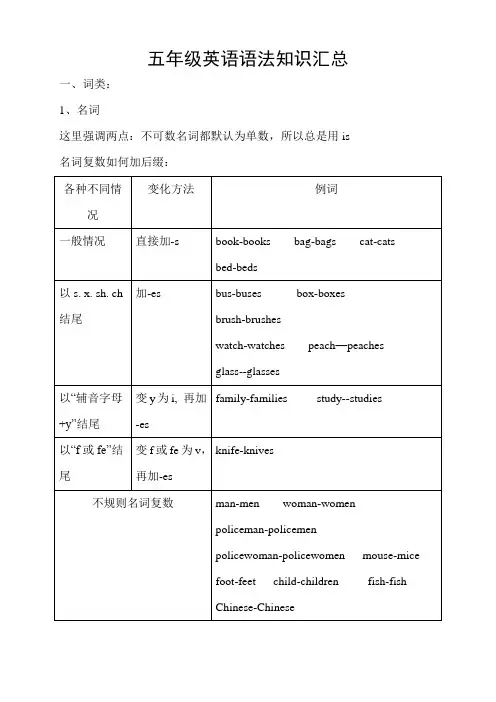
五年级英语语法知识汇总一、词类:1、名词这里强调两点:不可数名词都默认为单数,所以总是用is 名词复数如何加后缀:2、人称代词和物主代词人称代词:有主格和宾格之分。
一般动词前用主格,动词后用宾格。
3、指示代词4、冠词有a、an、the。
a和an的区别:an用于元音音素(一般就是元音字母a、e、i、o、u)前,a用于辅音音素前。
二、否定句:be动词(am、is、are)+not、情态动词can+ not、助动词(do、does)+ not如何将一个肯定的陈述句改为否定句:1、看句中有无be动词,如有,直接在be动词后+ not。
2、看句中有无情态动词,如有,直接在情态动词后+ not。
3、如上述二者都没有,就应用助动词+ not。
分四个步骤:(1)肯定陈述句中本来是没有助动词的,要加上去,位置在主语(某人或某物)后,动词前。
(2)确定助动词用do、does,根据句中动词,动词是原形的助动词就用do,动词是第三人称单数的助动词就用does,(3)在助动词后加not。
(4)原句中动词假如发生变化就要恢复成原形。
强调一点,有some的要考虑是否要用any。
三、一般疑问句。
如何将一个肯定的陈述句改为一般疑问句:1、看句中有无be动词,如有,把be动词提到句首即可。
2、看句中有无情态动词,如有,把情态动词提到句首即可。
3、如上述二者都没有,就应把助动提到句首。
分四个步骤:(1)肯定陈述句中本来是没有助动词的,要加上去,位置在主语(某人或某物)后,动词前。
(2)确定助动词用do还是does,根据句中动词,动词是原形的助动词就用do,动词是第三人称单数的助动词就用does(3)把助动词后提到句首。
(4)原句中动词假如发生变化就要恢复成原形。
强调一点,有some的要考虑是否要用any。
四、特殊疑问句。
表示疑问,有疑问词(在开头),回答有很多种可能。
常用疑问词:五、时态1、一般现在时(1)一般现在时中的be动词:一般用原形:am is aream用于第一人称单数(I);is用于第三人称单数(he she it和其他人名或称谓,如:Ben his sister等);are用于第二人称单数(you)和所有复数(包括第一人称复数we、第二人称复数you;第三人称复数they和其他复数,如the children 、his parents等)。
五年级英语知识点整理
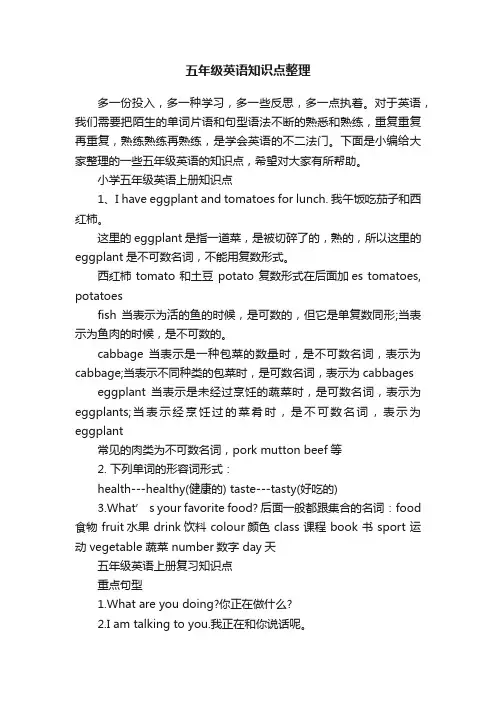
五年级英语知识点整理多一份投入,多一种学习,多一些反思,多一点执着。
对于英语,我们需要把陌生的单词片语和句型语法不断的熟悉和熟练,重复重复再重复,熟练熟练再熟练,是学会英语的不二法门。
下面是小编给大家整理的一些五年级英语的知识点,希望对大家有所帮助。
小学五年级英语上册知识点1、I have eggplant and tomatoes for lunch. 我午饭吃茄子和西红柿。
这里的eggplant是指一道菜,是被切碎了的,熟的,所以这里的eggplant是不可数名词,不能用复数形式。
西红柿 tomato 和土豆 potato 复数形式在后面加es tomatoes, potatoesfish 当表示为活的鱼的时候,是可数的,但它是单复数同形;当表示为鱼肉的时候,是不可数的。
cabbage 当表示是一种包菜的数量时,是不可数名词,表示为cabbage;当表示不同种类的包菜时,是可数名词,表示为cabbages eggplant 当表示是未经过烹饪的蔬菜时,是可数名词,表示为eggplants;当表示经烹饪过的菜肴时,是不可数名词,表示为eggplant常见的肉类为不可数名词,pork mutton beef等2. 下列单词的形容词形式:health---healthy(健康的) taste---tasty(好吃的)3.What’ s your favorite food? 后面一般都跟集合的名词:food 食物 fruit水果 drink饮料 colour颜色 class 课程 book 书 sport 运动 vegetable 蔬菜 number数字 day天五年级英语上册复习知识点重点句型1.What are you doing?你正在做什么?2.I am talking to you.我正在和你说话呢。
e on, John.老实点,约翰。
4.I’m reading a book.我正在看书。
五年级英语知识点总结
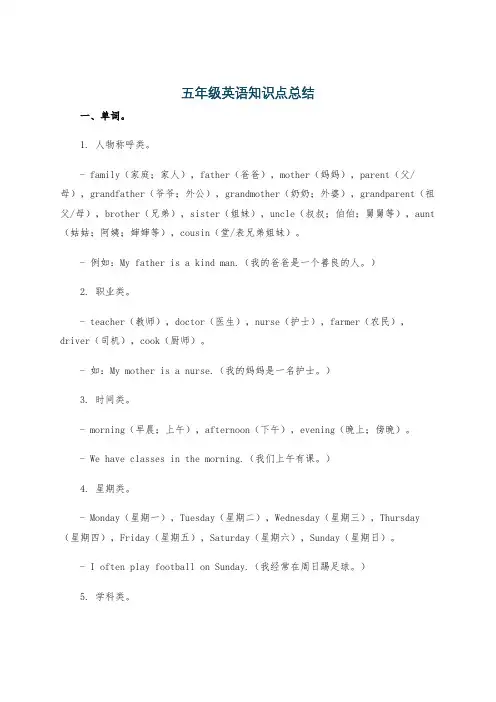
五年级英语知识点总结一、单词。
1. 人物称呼类。
- family(家庭;家人),father(爸爸),mother(妈妈),parent(父/母),grandfather(爷爷;外公),grandmother(奶奶;外婆),grandparent(祖父/母),brother(兄弟),sister(姐妹),uncle(叔叔;伯伯;舅舅等),aunt (姑姑;阿姨;婶婶等),cousin(堂/表兄弟姐妹)。
- 例如:My father is a kind man.(我的爸爸是一个善良的人。
)2. 职业类。
- teacher(教师),doctor(医生),nurse(护士),farmer(农民),driver(司机),cook(厨师)。
- 如:My mother is a nurse.(我的妈妈是一名护士。
)3. 时间类。
- morning(早晨;上午),afternoon(下午),evening(晚上;傍晚)。
- We have classes in the morning.(我们上午有课。
)4. 星期类。
- Monday(星期一),Tuesday(星期二),Wednesday(星期三),Thursday (星期四),Friday(星期五),Saturday(星期六),Sunday(星期日)。
- I often play football on Sunday.(我经常在周日踢足球。
)5. 学科类。
- Chinese(语文),English(英语),maths(数学),science(科学),music(音乐),art(美术),PE(体育)。
- My favourite subject is English.(我最喜欢的学科是英语。
)6. 形容词类。
- young(年轻的),old(年老的;旧的),funny(滑稽的;可笑的),kind (和蔼的;亲切的),strict(严格的)。
- Our English teacher is very kind.(我们的英语老师非常和蔼。
五年级英语语法基础知识大全
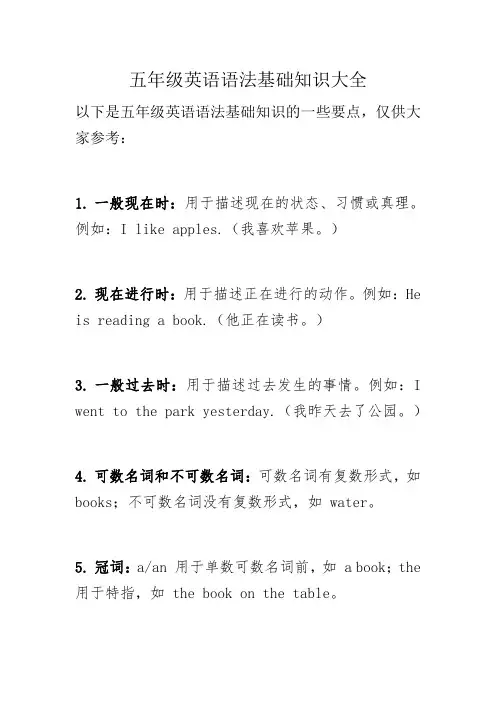
五年级英语语法基础知识大全
以下是五年级英语语法基础知识的一些要点,仅供大家参考:
1.一般现在时:用于描述现在的状态、习惯或真理。
例如:I like apples.(我喜欢苹果。
)
2.现在进行时:用于描述正在进行的动作。
例如:He is reading a book.(他正在读书。
)
3.一般过去时:用于描述过去发生的事情。
例如:I went to the park yesterday.(我昨天去了公园。
)
4.可数名词和不可数名词:可数名词有复数形式,如books;不可数名词没有复数形式,如water。
5.冠词:a/an用于单数可数名词前,如a book;the 用于特指,如the book on the table。
6.形容词和副词:形容词用于描述名词,如a big dog;副词用于描述动词,如run fast。
7.介词:用于表示方位、时间等,如in the classroom, at home。
8.句型:肯定句、否定句、疑问句(一般疑问句、特殊疑问句)、祈使句等。
9.时态一致性:句子中的动词时态应与主语保持一致。
10.There be句型:用于描述存在的事物,如There is a book on the table.(桌子上有一本书。
)。
五年级英语语法知识点归纳
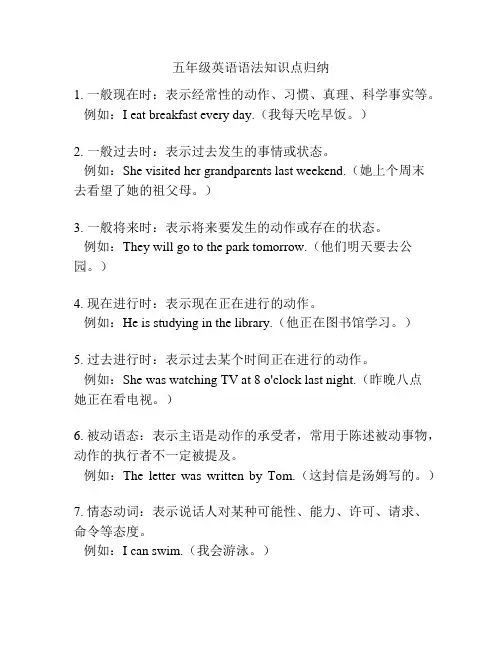
五年级英语语法知识点归纳1. 一般现在时:表示经常性的动作、习惯、真理、科学事实等。
例如:I eat breakfast every day.(我每天吃早饭。
)2. 一般过去时:表示过去发生的事情或状态。
例如:She visited her grandparents last weekend.(她上个周末去看望了她的祖父母。
)3. 一般将来时:表示将来要发生的动作或存在的状态。
例如:They will go to the park tomorrow.(他们明天要去公园。
)4. 现在进行时:表示现在正在进行的动作。
例如:He is studying in the library.(他正在图书馆学习。
)5. 过去进行时:表示过去某个时间正在进行的动作。
例如:She was watching TV at 8 o'clock last night.(昨晚八点她正在看电视。
)6. 被动语态:表示主语是动作的承受者,常用于陈述被动事物,动作的执行者不一定被提及。
例如:The letter was written by Tom.(这封信是汤姆写的。
)7. 情态动词:表示说话人对某种可能性、能力、许可、请求、命令等态度。
例如:I can swim.(我会游泳。
)8. 动词的时态变化:根据不同的时态,动词会发生相应的变化。
例如:go(一般现在时)→ goes(第三人称单数一般现在时)→ went(一般过去时)→ gone(过去分词)9. 形容词的比较级和最高级:用于比较两个或更多事物的大小、程度等。
例如:My sister is taller than me.(我姐姐比我高。
)10. 介词:用于表示事物之间的位置、关系等。
例如:The pen is on the table.(笔在桌子上。
)11. 不定代词:表达不确定或泛指的代词。
例如:Somebody called you.(有人给你打电话。
)12. 句子的结构:主语+谓语+宾语,疑问句的谓语和助动词需要进行调换。
五年级英语必考知识点总结
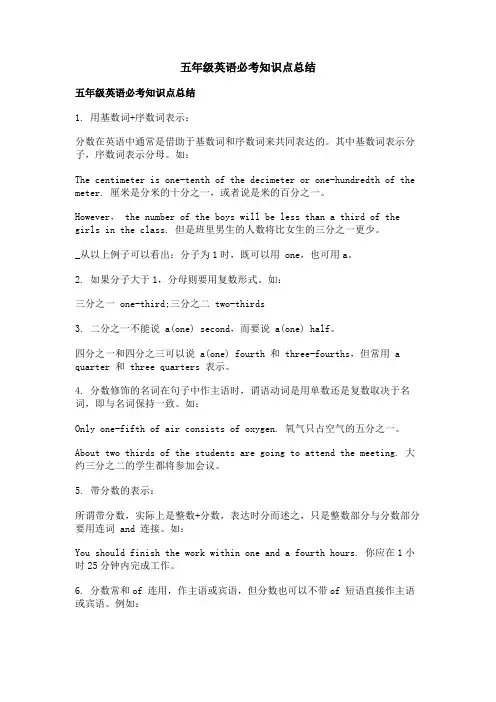
五年级英语必考知识点总结五年级英语必考知识点总结1. 用基数词+序数词表示:分数在英语中通常是借助于基数词和序数词来共同表达的。
其中基数词表示分子,序数词表示分母。
如:The centimeter is one-tenth of the decimeter or one-hundredth of the meter. 厘米是分米的十分之一,或者说是米的百分之一。
However, the number of the boys will be less than a third of the girls in the class. 但是班里男生的人数将比女生的三分之一更少。
_从以上例子可以看出:分子为1时,既可以用 one,也可用a。
2. 如果分子大于1,分母则要用复数形式。
如:三分之一 one-third;三分之二 two-thirds3. 二分之一不能说 a(one) second,而要说 a(one) half。
四分之一和四分之三可以说 a(one) fourth 和 three-fourths,但常用 a quarter 和 three quarters 表示。
4. 分数修饰的名词在句子中作主语时,谓语动词是用单数还是复数取决于名词,即与名词保持一致。
如:Only one-fifth of air consists of oxygen. 氧气只占空气的五分之一。
About two thirds of the students are going to attend the meeting. 大约三分之二的学生都将参加会议。
5. 带分数的表示:所谓带分数,实际上是整数+分数,表达时分而述之,只是整数部分与分数部分要用连词 and 连接。
如:You should finish the work within one and a fourth hours. 你应在1小时25分钟内完成工作。
6. 分数常和of 连用,作主语或宾语,但分数也可以不带of 短语直接作主语或宾语。
小学五年级英语知识点归纳总结
小学五年级英语知识点归纳总结小学五年级英语知识点归纳1.some用于肯定句中,在否定句和问句中改为any,但当表示委婉语气时仍用如:Can I have some writing paper? Would you like some orange juice?2.代词人称代词主格做主语用一般放在句首或动词前,主格分别是 I you he she it we you they。
宾格做宾语用,一般放在动词或介词后如:Open them for me. Let us …, join me等。
宾格分别是me you him her it us you them。
形容词性物主代词放在名词前,不能单独使用,分别是my your his her its our your their名词性物主代词相当于形物加名词,它只能单独使用后面不好加名词,分别是mine yours his hers its ours yours theirs。
3.介词介词后要么不加动词,加动词只能加动词ing形式如:be good at running;第1页共4页do well in jumping;4.时间介词季节前,月份前用介词in如:in summer;in March具体的哪一天如星期几,几月几日用介词on如:on Saturday; on the second of April; on Wednesday morning在几点钟前用介词at如:at a quarter to four;只在上下午晚上用in如:in the morning/ afternoon/ evening;但在夜间用at night。
另:季节,月份和星期前不好加the.5.名词复数构成的(方法)有规则的有:(1)直接在名词后加s如orange—oranges; photo—photos;(2) 以x, s, sh, ch 结尾的加es如:box—boxes; glass—glasses; waitress—waitresses; watch—watches;peach--peaches(3) 以辅音字母加y结尾的改y为i加es如:study—studies;library—libraries; hobby—hobbies;family—families;(4)以f, fe结尾的改f, fe 为v+es如:knife—knives; thief —thieves(注:以o结尾的我们学过的只有mango加es, mango—mangoes其余加s,)不规则的有:man—men; woman—women; people—people; child—children 6.动词第三人称单数的构成(1)直接在动词后加s如:run—runs; dance—dances(2)以s,sh,ch,o结尾的加es如:do—does;go—goes;wash—washes;catch—catches(3)以辅音字母加y结尾的改y为i加es如:study—studies; carry—carries;小学五年级英语知识点(总结)人称代词、名词所有格及序数词1、主格用来作句中的主语,用于动词前面。
小学五年级英语主要知识点有哪些
小学五年级英语主要知识点有哪些小学五年级英语主要知识点一、主要单词:do morning exercises 晨练,做早操 eat breakfast吃早饭have English class上英语课play sports进行体育活动eat dinner吃晚饭eat lunch吃午饭climb mountains 爬山go shopping购物,买东西 play the piano 弹钢琴visit grandparents 看望(外)祖父母go hiking去远足二、主要句子: When do you eat dinner?你什么时候吃晚饭?I eat dinner at 7:00 in the evening. 我晚上七点吃晚饭。
When do you get up? 你什么时候起床?I usually get up at 12:00 at noon.我通常在中午12点起床。
What do you do on the weekend?你在周末干什么?Usually I watch TV and go shopping. 我通常看电视和购物。
Sometimes I visit my grandparents.有时候我去看望我的外祖父母。
I often play football. 我经常踢足球。
Sometimes I go hiking.有时候我去远足。
三、同义词eat breakfast—have breakfast eat lunch—have lunch eat dinner—have dinner play sports—do sportsusually—often复数形式:policeman—policemen policewoman—policewomen现在分词:tell—telling三单:say—says同义句:What do you do ? ---What are you? 你是干什么的?四、表示频度的副词:always 总是,一直usually 通常,常常often 经常sometimes 有时候五、以复数形式出现的词组:visit grandparents plant trees六、介词后跟表示时间的词语时,表示在某年、某月、某个季节,某个时候(在上午,在下午,在晚上)用in;表示在某一天,在星期几用on,在具体的几点几分用at.七、too 和either的用法区别:too和either都是“也”的意思,但too用于肯定句,either用于否定句。
五年级英语知识点总结
五年级英语知识点总结一、词汇积累1. 基础词汇- 学校科目:Math(数学)、Science(科学)、History(历史)、Art(艺术)- 常见动物:Dog(狗)、Cat(猫)、Bird(鸟)、Fish(鱼)- 家庭成员:Mother(母亲)、Father(父亲)、Sister(姐妹)、Brother(兄弟)- 职业:Teacher(教师)、Doctor(医生)、Nurse(护士)、Policeman(警察)- 常见颜色:Red(红色)、Blue(蓝色)、Green(绿色)、Yellow(黄色)- 常见食物:Apple(苹果)、Banana(香蕉)、Chicken(鸡肉)、Rice(米饭)2. 扩展词汇- 学校活动:Reading Club(阅读俱乐部)、Sports Day(运动会) - 节假日:Christmas(圣诞节)、New Year's Day(元旦)- 自然现象:Rain(雨)、Snow(雪)、Thunderstorm(雷暴)- 交通工具:Bicycle(自行车)、Bus(公共汽车)、Train(火车)- 学校设施:Library(图书馆)、Gym(体育馆)、Cafeteria(食堂)二、语法要点1. 时态- 一般现在时:表示经常发生的动作或状态,如:I go to school every day.- 一般过去时:表示过去发生的动作或状态,如:He visited his grandparents last week.- 一般将来时:表示将来发生的动作或状态,如:They will go on a trip next month.2. 代词- 人称代词:I(我)、You(你)、He(他)、She(她)、It (它)、We(我们)、They(他们)- 物主代词:My(我的)、Your(你的)、His(他的)、Her(她的)、Its(它的)、Our(我们的)、Their(他们的)3. 句型结构- 肯定句:The sun rises in the east.- 否定句:The sun does not rise in the west.- 疑问句:Does the sun rise in the east? / The sun doesnot rise in the west, does it?4. 简单句和并列句- 简单句:She reads a book.(她读一本书。
五年级英语语法知识点总结
五年级英语语法知识点总结1. 名词名词是指表示人、物、地点、抽象概念等事物名称的词语。
在英语中,名词分为可数名词和不可数名词。
1.1 可数名词可数名词是指可以计数的名词,它们有单数和复数两种形式。
在使用可数名词的时候,需要注意如下几点:•可数名词单数形式前通常用冠词a或an,表示一个;•可数名词复数形式前通常用冠词the或不用冠词,表示多个;•以“辅音字母+y”结尾的单词,在变成复数形式时需将y改为i,再加es;•以“f”或“fe”结尾的单词,在变成复数形式时需将f或fe改为v,再加es。
1.2 不可数名词不可数名词是指无法计数的名词,它们只有单数形式。
在使用不可数名词的时候,需要注意如下几点:•等量的不可数名词可以用some表示;•不可数名词可以用量词来表示数量,如a cup of water、a piece of bread等。
2. 动词动词是指表示动作、状态或行为的词语。
在英语中,动词分为不及物动词和及物动词。
2.1 不及物动词不及物动词是指指无需接受宾语的动词。
它们不需要在句子中加宾语,通常用于表示某种状态、行为或者变化。
例如:•I swim every morning.(我每天早上游泳。
)•The flowers smell sweet.(花香四溢。
)2.2 及物动词及物动词是指需要接受宾语的动词。
它们需要在句子中加上宾语,通常用于表示动作和行为。
例如:•She drinks a cup of tea every morning.(她每天早上喝一杯茶。
)•He reads a book every night.(他每天晚上读一本书。
)3. 形容词形容词是指用来修饰名词或代词的词语。
在英语中,形容词需要符合名词的单数和复数形式。
例如:•This is a beautiful flower.(这是一朵美丽的花。
)•These are beautiful flowers.(这些是美丽的花。
)4. 副词副词是指用来修饰动词、形容词、其他副词或全句的词语。
- 1、下载文档前请自行甄别文档内容的完整性,平台不提供额外的编辑、内容补充、找答案等附加服务。
- 2、"仅部分预览"的文档,不可在线预览部分如存在完整性等问题,可反馈申请退款(可完整预览的文档不适用该条件!)。
- 3、如文档侵犯您的权益,请联系客服反馈,我们会尽快为您处理(人工客服工作时间:9:00-18:30)。
五年级上册
Unit 1 my new teachers
We have a new English teacher. 我们有一个新英语老师。
Who’s your English teacher?谁是你们的英语老师?
Mr Carter. He’s from Canada.卡特先生。
他来自加拿大。
What’s he like?他长得怎样?
funny. 他又高又强壮。
他很滑稽。
He’s tall and strong. He’s very
Young funny tall strong kind old short thin strict active funny quiet
Unit 2 my days of the week
今天星期几?今天星期一。
Wha t day is it today? It’s Monday.
What do we have on Monday? 我们星期一有什么课?
Let me see. 让我看看。
We have English, science, computer and P.E on Monday.
我们星期一有英语,科学,电脑和体育课。
What do you do on Saturday? 你星期六干什么?
I often do my homework and watch TV. 我通常做作业和看电视。
What about you/ 你呢?
I often do housework and read books. 我通常做家务活和看书。
Sunday Monday Tuesday Wednesday Thursday Friday Saturday weekday weekend tomorrow today English moral education social study Chinese science maths do homework read books watch TV play computer games do housework
Unit 3 what’s your favouirite food?
What do you have for lunch today/on Monday? 你今天/星期一中餐吃什么?
We have tomatoes, tofu and fish. 我们吃番茄、豆腐和鱼。
What’s your favorite food?你最喜欢的食物是什么?
I like apples. They are sweet. 我喜欢苹果,他们很甜。
What would you like for dinner? 你晚餐想吃点什么?
I’d like potatoes.我想吃土豆。
cabbage pork mutton eggplant fish bean green beans tofu potato tomato grape fruit tasty sweet sour fresh healthy salty
Unit 4 what can you do?
What can you do? 你会干什么?
I can clean the bedroom. 我会打扫房间。
Can you cook the meals? 你会烧饭吗?
Yes, I can./ no, I can’t.会/不会。
I’m helpful. Are you helpful at home?我是有帮助的。
你在家里会干活吗?
I’d like to have a try.我想要试一试。
empty the trash cook the meals water the flowers sweep the floor wash the window clean the bedroom do housework set the table do the dishes wash the clothes make the bed
use a computer put away the clothes
play chess
Unit 5 my new room
Is this your bedroom? 这是你的房间吗?
Where is the trash bin? 垃圾桶在哪里?
It’s behind the door.在门后。
What’s it like?它什么样子?
There is a big closet, a new air-conditioner and two end tables.
那儿有一个大衣柜、一个新空调和两张床头柜。
air-conditioner curtain trash bin closet mirror end table
bedroom kitchen bathroom living room in on near
under behind over in front of
Unit 6 in a nature park
There is a forest in the nature park.. 在自然公园里有一个森林。
There are many small houses in my village. 在我们村庄有许多小房子。
Is there a mountain? Y es, there is./ No, there isn’t.
有高山吗?有的/没有。
Are there any bridges over the river? Yes, there are./ No, there aren’t.
河上有桥吗?有的/没有。
sky cloud mountain river flower grass lake forest path
park farm village city house bridge tree road building air
1. It’s time lunch.
2. We do homework in the evening.
3. Do you like (read) books?
4. is today? 今天星期几?
5. Sarah usually plays chess Sunday.
6. is the first day of a week.
7. we (not have) English on Saturday.
8. do you often do on Mondays?
9. do you have English?
10.Would you like cakes ?
五年级下册
Unit 1 This is my day
When do you do morning exercises? 你几点钟做早操?
I usually eat breakfast at 7:00. 我通常七点钟吃早饭。
What do you do on the weekend? 你周末干什么?
I often visit my grandparents. 我常常去看望祖父母。
Sometimes I go hiking. 有时候我去远足。
do morning exercises eat breakfast get up
have English class play sports eat dinner
climb mountains go shopping go hiking
visit grandparents play the piano
when evening noon weekend usually often sometimes Unit 2 what’s your favourite season?
What’s your favourite season? =Which sea son do you like best?
你最喜欢的季节是什么?
My favourite season is summer.=I like summer best.
我最喜欢夏天。
Why do you like winter? 你为什么喜欢冬天?
Because I can play with snow. 因为我可以在雪里玩。
What’s the weather like in spring?春天的天气怎样?
It’s windy and warm.有风的,很暖和。
Summer is good, but fall is my favourite season.
夏天很好,但是秋天才使我最喜欢的季节。
Spring summer fall winter season which why because best swim sleep fly kites skate plant trees make a snowman。
